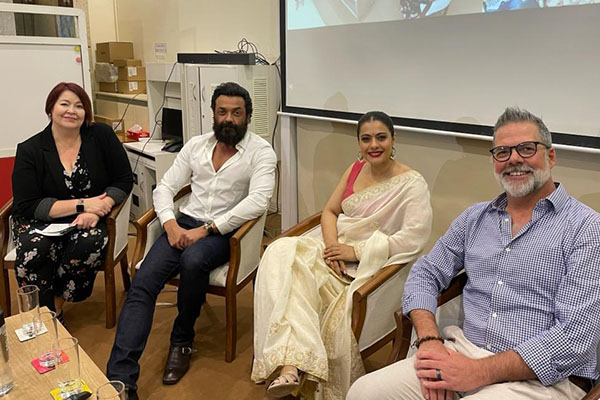The Institute Goes to India

Tricia Jones-Parkin, Bobby Deol, Kajol, Dr. Tim Riesen
It’s not every day that a presentation on customized employment lands IDRPP staff members on panel with Bollywood stars in India. But it happened earlier this spring, and the visit to India left a lasting impression on two continents.
It began when Dr. Tim Riesen, who leads IDRPP’s Research & Training Division, presented on customized employment to the International Association for Special Education in Viet Nam.
That presentation was heard by Radhika Misquitta, co-principal of the Gateway School in India. She asked two of her teachers to follow up with Riesen and Tricia Jones-Parkin of the Institute for Disabilites’ Center for Employment and Inclusion.
“We found customized employment as a model that aligned with our philosophy, and were literally just beginning on that path when our co-principal met Tim Riesen,” Bindiya Hassaram, a Gateway teacher, said in an email interview.
The Gateway School is a non-governmental organization that serves a variety of students with a variety of abilities. Its high school is just getting started on transitioning from high school to the working world. “We were struggling with the employment piece, because we did not want to venture down the sheltered workshop route, which is one of the main trajectories in India,” Hassaram wrote.
They started some monthly Zoom calls, but at some point the teachers said Riesen and Jones-Parkin needed to come and see how employment for people with disabilities works in India. And after visiting, observing and talking to people at the Gateway School, they agreed the social and employment structure in India is very different. Social class can restrict where people work, regardless of disability status. If a person with disabilities came from a high-status family, they were expected to avoid jobs that are considered entry-level here in the United States, like food service or janitorial work. And in India, there was no government support for disability employment programs. The Gateway School was working to build partnerships with businesses, including the posh Taj hotel chain, to start internships that could lead to post-high employment.
“Because India is predominantly a collectivist culture, families do not insist on young adults being independent,” Hassaram said. “They've never imagined their child in a workplace.”
Soon after Riesen and Jones-Parkin landed in Mumbai, they were taken to meet with a group of parents. “They listened, they came prepared,” Riesen said. “They asked really good questions.”
“Tim gave some sage advice to the parent body.,” Hassaram said. “He said something akin to, ‘Have high expectations for your own children. Expose them to being self-reliant from a young age.’”
Jones-Parkin, Riesen and Hassaram agreed: Low expectations are common in both cultures. Supervisors may not be sure how to manage employees with disabilities. Employees may not have enough responsibilities to keep them engaged. But Jones-Parkin was pleasantly surprised to see that the expectations of teachers at the Gateway School were high. “In every single classroom, I saw so much engagement and learning; a higher level of expectation or value of teaching these kids.”
Due to the networking efforts of Gateway school officials, Riesen and Jones-Parkin also participated in a panel discussion in a fundraiser covered by the various news organizations. Bollywood stars Bobby Deol and Kajol were also on the panel. “It got a lot of press around Mumbai,” Jones-Parkin said.
“People were there to see Kajol and Bobby Deol, but because Kajol and Bobby Deol were there, they heard what we were saying,” Riesen said.
“It was pretty surreal,” said Jones-Parkin.
After that they shared information with teachers and finished off the week with a symposium. “Tricia taught me personally the practice of being student centric; thinking of everything from the viewpoint of the student,” Hassaram said. “They gave us so much hope and inspiration!”
The experience has stayed with Riesen and Jones-Parkin, too. “I was energized by just the power of parents saying, 'This is not what I want for my son or daughter,'” Jones-Parkin said.

